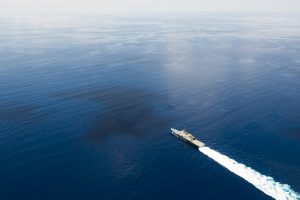Yesterday, the arbitral tribunal issued a much-anticipated ruling in the Philippines’ South China Sea case against China (See: “Does the Philippines’ South China Sea Case Against China Really Matter?“). The tribunal ruled overwhelmingly in favor of Manila, determining that the extent of several major elements of Beijing’s claim and its efforts to enforce it were unlawful.
I’ve got a piece out with The Straits Times that examines what the verdict means for China and the Philippines along with other regional and global actors. In it, I argue that while the ruling itself was quite clear and decisive, its implications are much less clear.
For China, though the verdict is quite clearly a rebuke of its claim and actions taken to enforce it, Beijing still has a range of choices before it. Escalatory moves like boosting naval and coast guard presence in disputed areas or stepping up militarization in the Spratlys may be needed, but there are also incentives for restraint, especially with the new government in the Philippines adopting a more conciliatory approach relative to its predecessor. Beijing may well end up carefully calibrating its moves in the coming months instead of adopting one extreme course or the other.
The implications for the Philippines are also unclear. On the one hand, the clarity of the ruling and Manila’s deliberate choice to not “taunt or flaunt” its victory, as Duterte put it, may pave the way for negotiations or even setting aside disputes to focus on economic cooperation. That said, as I emphasized in a previous piece, Duterte also cannot ignore domestic and international factors in his China and South China Sea approach (See: “The Danger of Duterte’s China and South China Sea Approach“). In this sense, the verdict is also now another limiting factor for Duterte, as it sets certain parameters on how he can pursue things like joint development with China which his administration has not been clear about thus far.
The verdict obviously has implications for others beyond just Beijing and Manila. The clarity on definitions of islands and rocks will have ripple effects on other claimants (as well as other disputes). As it is, the tribunal’s ruling on the status of Itu Aba as a rock rather than an island has already drawn a strong response from Taiwan. The illegality of the nine-dash line also gives more legal backing to other states like Malaysia and Indonesia (which considers itself a non-claimant) which have been subject to several intrusions by Beijing into their waters. Yet what these countries do with this is still unclear (See: “Indonesia’s South China Sea Policy: A Delicate Equilibrium“). Some may choose to react more boldly to Chinese encroachments, while others may even follow Manila’s footsteps and take Beijing to court. Still others may choose not to raise the stakes with China for various reasons ranging from their assessment of their overall relationship with Beijing to the state of their own capabilities (See: “Malaysia’s South China Sea Policy: Playing it Safe“).
Beyond countries with direct claims in the South China Sea, the ruling also has implications for the region and world more generally. As I have written before, a group of interested and concerned states have made it clear that they have an interest in seeing that basic principles that are part of the so-called “rules-based international order,” like the peaceful resolution of disputes and the freedom of navigation and overflight, are upheld in the South China Sea. Those same countries now need to convince China to abide by the decision or find a face-saving way out, while at the same time countering laggards who may be unwilling to do so and preserving their own broader ties with Beijing.
That’s a rather tough balancing act. Unilateral post-verdict statements have already been flowing out of various capitals, and I’d expect a broader diplomatic campaign by some states in bilateral meetings and regional and international fora in support of the verdict, with a few laggards attempting to resist (See: “US Hits Right Not At Shangri-La With Principled Security Network“). An early litmus test will come at the next round of ASEAN summitry in Vientiane later this month, where the world will be watching to see whether the regional grouping can at least adopt a joint communique with basic language in support of the principles undergirding the verdict (I’ve personally written that a separate statement on the verdict both makes sense and is far from unprecedented, however unlikely it may be).
But the real test of whether states are willing to do their part to uphold the rules-based international order will come when it is time for action, not just words. To be sure, given the limited military capabilities of most ASEAN states relative to Beijing, the burden will largely fall on the United States and its allies and partners like Japan to either deter potential moves by China or counter aggressive ones that it does undertake. The extent to which these countries are willing to do so and the degree to which claimant countries will be involved is the critical question.
Though I’ve sketched the main points of the piece, I’d encourage you to read the full thing here.
































